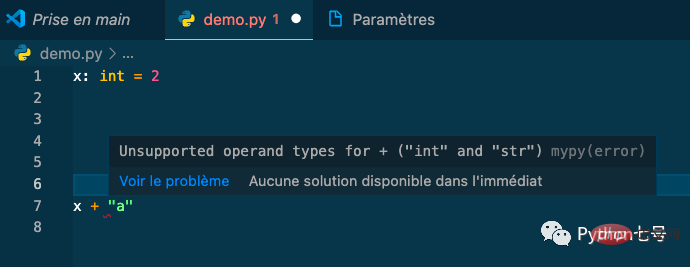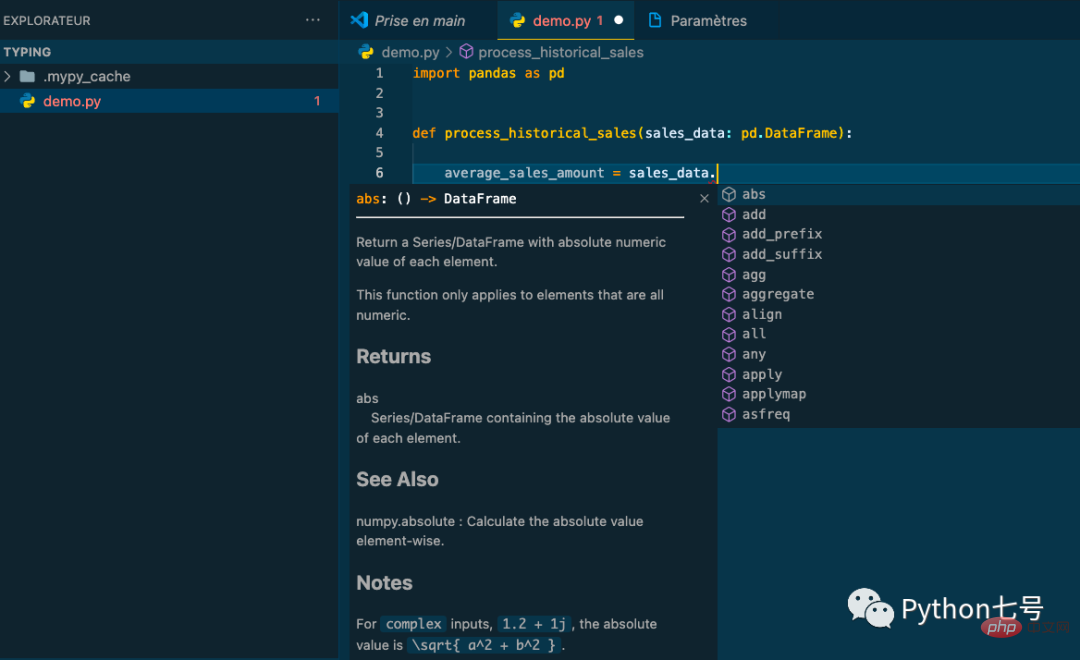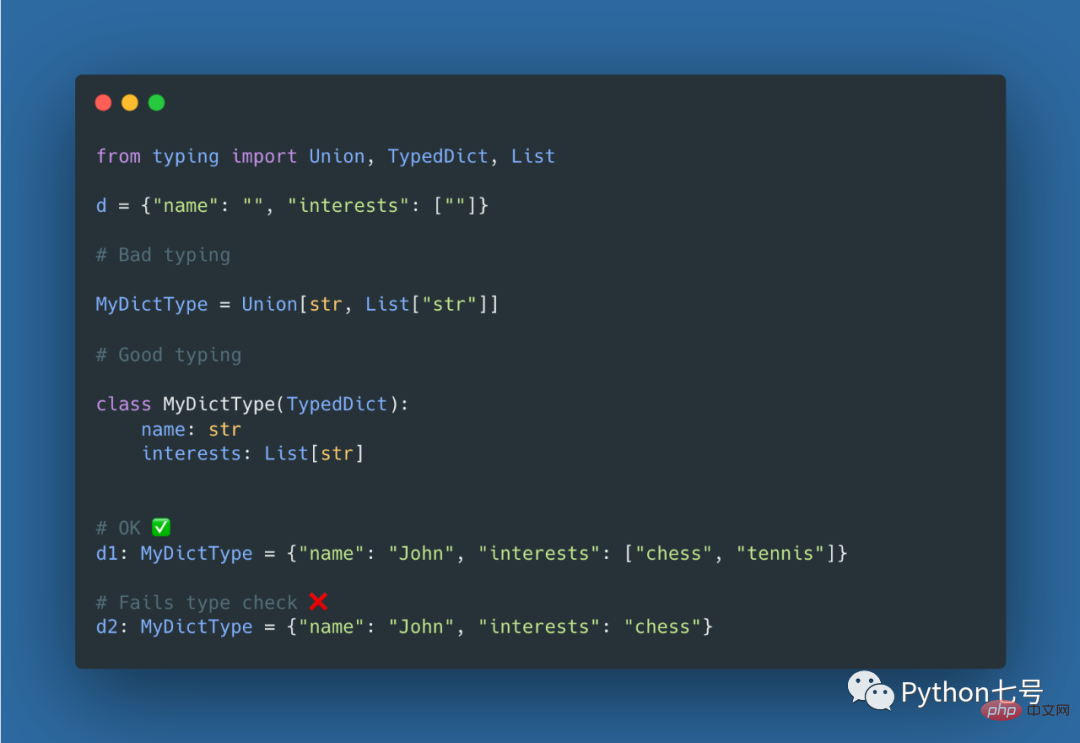Best practices for type hints in Python
It’s great to use dynamic language for a while, and the code is reconstructed in the crematorium. I believe you must have heard this sentence. Like unit testing, although it takes a small amount of time to write code, it is very worthwhile in the long run. This article shares how to better understand and use Python's type hints.
1. Type hints are only valid at the syntax level.
Type hints (introduced since PEP 3107) are used to add variables, parameters, function parameters and their return values, class attributes and methods. type.
Python's variable types are dynamic and can be modified at runtime to add type hints to the code. It is only supported at the syntax level and has no impact on the running of the code. The Python interpreter will ignore it when running the code. Type hints.
Therefore, an intuitive function of type hints is to improve the readability of the code, making it easier for the caller to pass in/out parameters of the appropriate type, and facilitating code reconstruction.
Python’s built-in basic types can be used directly for type hints:
Type hint examples for variables:
a: int = 3
b: float = 2.4
c: bool = True
d: list = ["A", "B", "C"]
e: dict = {"x": "y"}
f: set = {"a", "b", "c"}
g: tuple = ("name", "age", "job")Type hints for functions:
def add_numbers(x: type_x, y: type_y, z: type_z= 100) -> type_return: return x + y + z
here The type_x, type_y, type_z, type_return can be built-in basic types or custom types.
Type hint of class:
class Person: first_name: str = "John" last_name: str = "Does" age: int = 31
2. Use mypy to check the type hint
If there is such a piece of code:
x: int = 2 x = 3.5
There will be no errors when executing with the Python interpreter:

With the help of mypy, first install it with pip install mypy, and then mypy script.py:

For more mypy related information, please refer to the previous article mypy. This tool makes Python's type hints very practical.
3. The benefits of type hints
If the interpreter does not enforce type hints, why write type hints? It's true that type hints don't change the way your code runs: Python is dynamically typed by nature, and that's unlikely to change. However, from a developer experience perspective, type hints have many benefits.
(1) Use type hints, especially in functions, to clarify parameter types and the type of results produced, which is very easy to read and understand.
(2) Type hints eliminate cognitive overhead and make code easier to read and debug. Given the types of inputs and outputs, you can easily infer the objects and how they are called.
(3) Type hints can improve the code editing experience. IDEs can rely on type checking to statically analyze your code and help detect potential errors (e.g., passing parameters of the wrong type, calling the wrong method, etc.). Additionally, autocompletion is provided for each variable based on type hints.

Type checking of IDE

Type checking of IDE

Auto-completion after IDE type checking
4. List usage
If you need a float type hint inside the list, this will not work:
def my_dummy_function(l: list[float]): return sum(l)
The standard library typing takes this problem into consideration, you can do this:
from typing import List def my_dummy_function(vector: List[float]): return sum(vector)
5. Dict usage
If you want to prompt such a type:
my_dict = {"name": "Somenzz", "job": "engineer"}With the help of Dict, you You can define the type like this:
from typing import Dict
my_dict_type = Dict[str, str]
my_dict: my_dict_type = {"name": "Somenzz", "job": "engineer"}6. TypedDict usage
What if you need to prompt for such a type?
d = {"name": "Somenzz", "interests": ["chess", "tennis"]}With the help of TypedDict, you can do this:

TypedDict
7. Union usage
Starting in Python 3.10, Union is replaced by | This means that Union[X, Y] is now equivalent to X|Y.
Union[X, Y] (or X | Y) means X or Y.
Suppose your function needs to read files from the cache directory and load the Torch model. This cache directory location can be a string value (such as /home/cache), or it can be a Path object from the Pathlib library, in which case the code is as follows:
def load_model(filename: str, cache_folder: Union[str, Path]): if isinstance(cache_folder, Path): cache_folder = str(cache_folder) model_path = os.join(filename, cache_folder) model = torch.load(model_path) return model
8, Callable Usage
When you need to pass in a function as a parameter, the type hint of this parameter can be Callable.
from typing import Callable def sum_numbers(x: int, y: int) -> int: return x + y def foo(x: int, y: int, func: Callable) -> int: output = func(x, y) return output foo(1, 2, sum_numbers)
You can also specify a parameter list for such function parameters, which is really powerful:
Syntax:
Callable[[input_type_1, ...], return_type]
Example:
def foo(x: int, y: int, func: Callable[[int, int], int]) -> int: output = func(x, y) return output
9、Any 用法
当你传入的参数可以为任何类型的时候,就可以使用 Any
def bar(input: Any): ...
10、Optional 用法
如果你的函数使用可选参数,具有默认值,那么你可以使用类型模块中的 Optional 类型。
from typing import Optional def foo(format_layout: Optional[bool] = True): ...
11、Sequence 用法
Sequence 类型的对象是可以被索引的任何东西:列表、元组、字符串、对象列表、元组列表的元组等。
from typing import Sequence
def print_sequence_elements(sequence: Sequence[str]):
for i, s in enumerate(s):
print(f"item {i}: {s}"12、Tuple 用法
Tuple 类型的工作方式与 List 类型略有不同,Tuple 需要指定每一个位置的类型:
from typing import Tuple t: Tuple[int, int, int] = (1, 2, 3)
如果你不关心元组中每个元素的类型,你可以继续使用内置类型 tuple。
t: tuple = (1, 2, 3, ["cat", "dog"], {"name": "John"})最后的话
类型提示在代码之上带来了额外的抽象层:它们有助于记录代码,澄清关于输入/输出的假设,并防止在顶部执行静态代码分析 (mypy) 时出现的隐蔽和错误。
The above is the detailed content of Best practices for type hints in Python. For more information, please follow other related articles on the PHP Chinese website!

Hot AI Tools

Undresser.AI Undress
AI-powered app for creating realistic nude photos

AI Clothes Remover
Online AI tool for removing clothes from photos.

Undress AI Tool
Undress images for free

Clothoff.io
AI clothes remover

AI Hentai Generator
Generate AI Hentai for free.

Hot Article

Hot Tools

Notepad++7.3.1
Easy-to-use and free code editor

SublimeText3 Chinese version
Chinese version, very easy to use

Zend Studio 13.0.1
Powerful PHP integrated development environment

Dreamweaver CS6
Visual web development tools

SublimeText3 Mac version
God-level code editing software (SublimeText3)

Hot Topics
 Is the conversion speed fast when converting XML to PDF on mobile phone?
Apr 02, 2025 pm 10:09 PM
Is the conversion speed fast when converting XML to PDF on mobile phone?
Apr 02, 2025 pm 10:09 PM
The speed of mobile XML to PDF depends on the following factors: the complexity of XML structure. Mobile hardware configuration conversion method (library, algorithm) code quality optimization methods (select efficient libraries, optimize algorithms, cache data, and utilize multi-threading). Overall, there is no absolute answer and it needs to be optimized according to the specific situation.
 Is there any mobile app that can convert XML into PDF?
Apr 02, 2025 pm 08:54 PM
Is there any mobile app that can convert XML into PDF?
Apr 02, 2025 pm 08:54 PM
An application that converts XML directly to PDF cannot be found because they are two fundamentally different formats. XML is used to store data, while PDF is used to display documents. To complete the transformation, you can use programming languages and libraries such as Python and ReportLab to parse XML data and generate PDF documents.
 How to convert XML files to PDF on your phone?
Apr 02, 2025 pm 10:12 PM
How to convert XML files to PDF on your phone?
Apr 02, 2025 pm 10:12 PM
It is impossible to complete XML to PDF conversion directly on your phone with a single application. It is necessary to use cloud services, which can be achieved through two steps: 1. Convert XML to PDF in the cloud, 2. Access or download the converted PDF file on the mobile phone.
 What is the function of C language sum?
Apr 03, 2025 pm 02:21 PM
What is the function of C language sum?
Apr 03, 2025 pm 02:21 PM
There is no built-in sum function in C language, so it needs to be written by yourself. Sum can be achieved by traversing the array and accumulating elements: Loop version: Sum is calculated using for loop and array length. Pointer version: Use pointers to point to array elements, and efficient summing is achieved through self-increment pointers. Dynamically allocate array version: Dynamically allocate arrays and manage memory yourself, ensuring that allocated memory is freed to prevent memory leaks.
 How to control the size of XML converted to images?
Apr 02, 2025 pm 07:24 PM
How to control the size of XML converted to images?
Apr 02, 2025 pm 07:24 PM
To generate images through XML, you need to use graph libraries (such as Pillow and JFreeChart) as bridges to generate images based on metadata (size, color) in XML. The key to controlling the size of the image is to adjust the values of the <width> and <height> tags in XML. However, in practical applications, the complexity of XML structure, the fineness of graph drawing, the speed of image generation and memory consumption, and the selection of image formats all have an impact on the generated image size. Therefore, it is necessary to have a deep understanding of XML structure, proficient in the graphics library, and consider factors such as optimization algorithms and image format selection.
 How to open xml format
Apr 02, 2025 pm 09:00 PM
How to open xml format
Apr 02, 2025 pm 09:00 PM
Use most text editors to open XML files; if you need a more intuitive tree display, you can use an XML editor, such as Oxygen XML Editor or XMLSpy; if you process XML data in a program, you need to use a programming language (such as Python) and XML libraries (such as xml.etree.ElementTree) to parse.
 How to convert xml into pictures
Apr 03, 2025 am 07:39 AM
How to convert xml into pictures
Apr 03, 2025 am 07:39 AM
XML can be converted to images by using an XSLT converter or image library. XSLT Converter: Use an XSLT processor and stylesheet to convert XML to images. Image Library: Use libraries such as PIL or ImageMagick to create images from XML data, such as drawing shapes and text.
 Recommended XML formatting tool
Apr 02, 2025 pm 09:03 PM
Recommended XML formatting tool
Apr 02, 2025 pm 09:03 PM
XML formatting tools can type code according to rules to improve readability and understanding. When selecting a tool, pay attention to customization capabilities, handling of special circumstances, performance and ease of use. Commonly used tool types include online tools, IDE plug-ins, and command-line tools.






